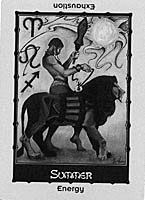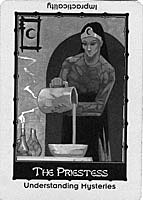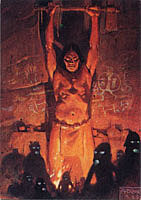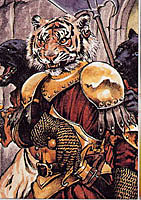On Character Creation in Everway
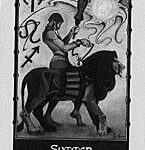
Jonathan Tweet explains how, unlike highly narratively structured games such as The Call of Cthulhu, the free-form, character-focused Everway includes a matrix that allows for the creation of coherent characters and productively constrains the otherwise open-ended game-play.
Everway is a free-form tabletop fantasy RPG in which players take the roles of heroic figures that travel among countless parallel worlds. Action resolution uses cards drawn from a Tarotlike deck rather than dice. Character stats determine the likely outcome of an action, and the card draw provides a conceptual result that the gamemaster interprets creatively to determine the actual result.
Accommodating Free-form Character Creation in Everway
When creating a character for Everway, the first thing a player does is select from a deck of several trading-card size “vision cards.” These cards depict warriors, monsters, temples, magicians, exotic animals, and other fantastic characters, creatures and settings. Each player chooses five cards and invents a character based on them. In general, the cards represent the character and scenes from the character’s life, but they can also represent visions, goals, enemies, etc. The challenge in designing Everway was helping the gamemaster be ready to accommodate any possible character that players could dream up.
Question and Answer
During character creation, players show each other their vision cards and explain who their characters are. Then they take turns asking questions about the other players’ characters. This step helps players develop their characters more thoroughly and engages the whole group in each player’s story. For the gamemaster, however, it’s an opportunity to be sure that the free-form nature of character creation hasn’t left the character missing important details. Question and answer is important for:
-
Engagement: Listening to a player talk about their character is widely recognized as dull. It’s like listening to someone recount a dream: it means a lot more to the talker than to the listener. The Q&A process, however, turns the monologue into a dialogue. It makes character exposition much more engaging.
-
Combat Abilities: Standard RPG characters have their combat abilities finely detailed, but free-form characters can have poorly defined combat capabilities. If the character has no apparent combat abilities, the GM might ask, “How would your character handle herself in a fight?” If the character has multiple combat abilities, the GM might ask which is the character’s best combat tactic.
-
Motivation: Standard RPG characters come with built-in motives, such as “find treasure” or “defeat supervillains.” Free-form characters, however, are sometimes conceived as unlikely to get involved in the plots that are going to drive the campaign. In such a case, the gamemaster can ask, “What sort of circumstances would motivate your character to get involved in trouble or danger?”
Personality Traits
Everway has four “personality” traits to ensure that the free-form character has direction:
-
Motive: A common flaw in free-form character concepts is that the character has no motivation. The player, in order to play “in character,” avoids conflicts, and a character that avoids conflicts is boring. In Everway, each player chooses a motivation so that each character has some reason to get involved in the conflicts that are going to make the campaign interesting.
-
Virtue, Fault, and Fate: Each player chooses three cards from the Fortune deck to represent a personal strength, a personal weakness, and some personal conflict to be resolved. This step helps the player take the broad character concept and sum it up. This step is also a hook for the gamemaster, who uses it to see what is central to each character’s personal story.
Character Powers
Everway has no list of special powers from which players choose. The system has to be able to take any power that a player has dreamed up and assign a “value” or “power level” to it, so that it can be balanced in the overall character equation. Powers I’ve seen in play include prophetic visions, the ability to drain life energy from others, and the posession of the mummified hand of the character’s dead lover (a fetish that channels fiery attacks). Each power is rated on whether it’s versatile, whether it’s potent, and whether it frequently makes a difference in play. For each answer Yes, the power costs 1 point, with a maximum of 3. It’s a grainy measure of power level, but it’s precise enough for free-form play. The gamemaster takes character powers into account when adjudicating actions, but there is no separate mechanic for using powers.
Games Cited
Everway. Jonathan Tweet; Wizards of the Coast. 1995.
Cite this article
Tweet, Jonathan. "On Character Creation in Everway" Electronic Book Review, 24 December 2007, https://electronicbookreview.com/publications/on-character-creation-in-everway/
